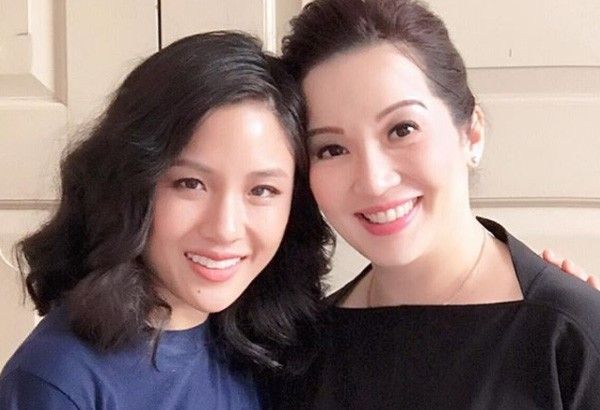As Princess Intan, the Philippines’ “most famous woman,” in writer Kevin Kwan’s words, more than acquits herself. For sure, there wasn’t much the yellow-, Michael Cinco-clad Kris Aquino could chew on, given that it was a cameo role. But you could see director Jon M. Chu’s camera lingering on Kris a little while longer during the film’s wedding scene.
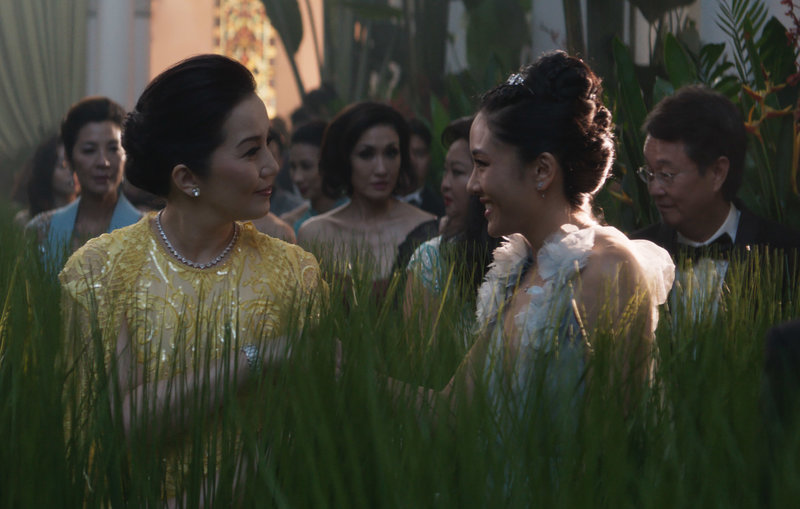
By Alex Y. Vergara
So, the much-awaited release of “Crazy Rich Asians” finally hit Manila earlier this week. If you’ve read New York-based Singaporean writer Kevin Kwan’s best-selling novel (and its two sequels), we won’t bore you anymore with the full details. If you haven’t, we won’t spoil your fun, as it’s not required reading if you plan to see the movie version—a must-watch adaptation, if only for its sleek production design and entertainment values—this weekend.
That the film was reportedly well received by Asian-American audiences in the US when it opened more than a week ago is a given. For whatever reason, it was a proud moment for many of them that they couldn’t help but reach for a box of Kleenex, as they cried their hearts out inside darkened cinemas, never mind if the film is by and large a romantic comedy with Akwafina (as Peik Lin) and Filipino-American Nico Santos (as Oliver T’sien) tasked to generate the laughs, and how!
Not since Amy Tan’s “The Joy Luck Club,” another novel-turned-film, was shown 25 years ago, has Hollywood produced a mainstream feature film with an all-Asian cast. Naturally, Asian-Americans, presumably, including Filipinos, after all these decades of being a largely invisible segment of American society, feel validated.
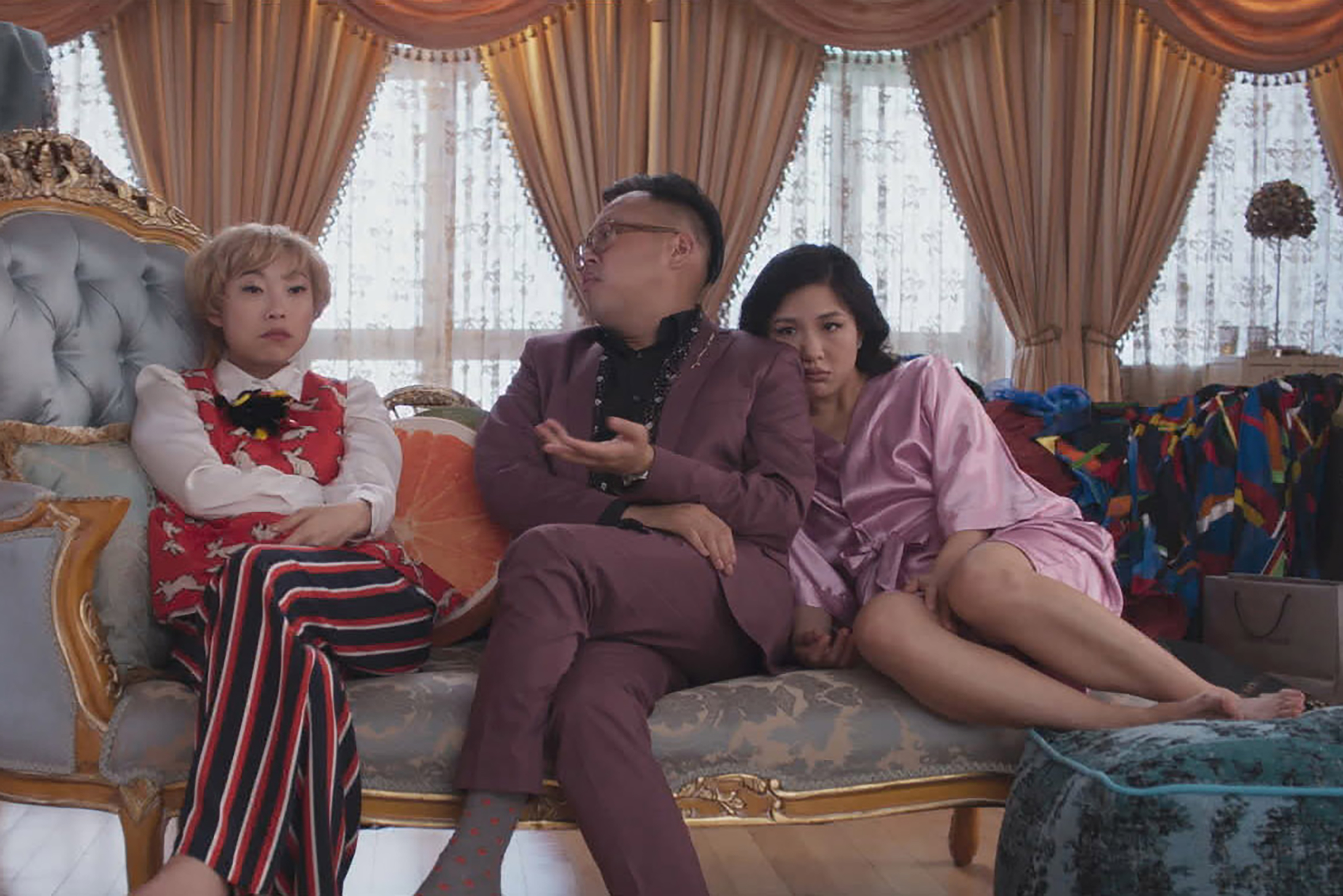
That’s all very well except that nothing could have been further removed from the Asian-American experience, as articulated by lead character Rachel Chu (the film’s pretty and likable ingenue portrayed by Constance Wu), than the outrageous lifestyles and haughty, exclusive mindsets displayed by many of the old rich Singapore-based characters in the film, led by certain members of the Young clan and their über-chic friends in high society.
Raised by a single mother who ran to America to escape an abusive husband in China, US-born Rachel, an economics professor at NYU, is a product of reinvention and the personification of the American dream—a dream that promises you untold dividends if you simply learn how to roll up your sleeves, pull yourself by the bootstraps, remain focused, and work hard and smart enough.
Unlike the rest of us, though, Rachel is dating New York-based history professor Nick Young (the dashing and impossibly handsome Henry Golding), who, unbeknownst to her (in the age of Google and social media, would you believe?) until they reached his native Singapore to attend Nick’s best friend’s wedding, is the “Prince William of Asia.” (“Actually, I’m more of a Harry,” Nick, in his mild British accent, deadpans.)
Rachel’s singular achievement, no matter how admirable, was lost on or perhaps totally ignored by the likes of Eleanor Young (deliciously essayed with such nuance by a stylish Michelle Yeoh), Nick’s mother, who later told her son’s girlfriend in one pivotal scene in the film that despite her many accomplishments, “you’ll never be enough.” Well, at least, not in her and her rarefied high society cohorts’ estimation.
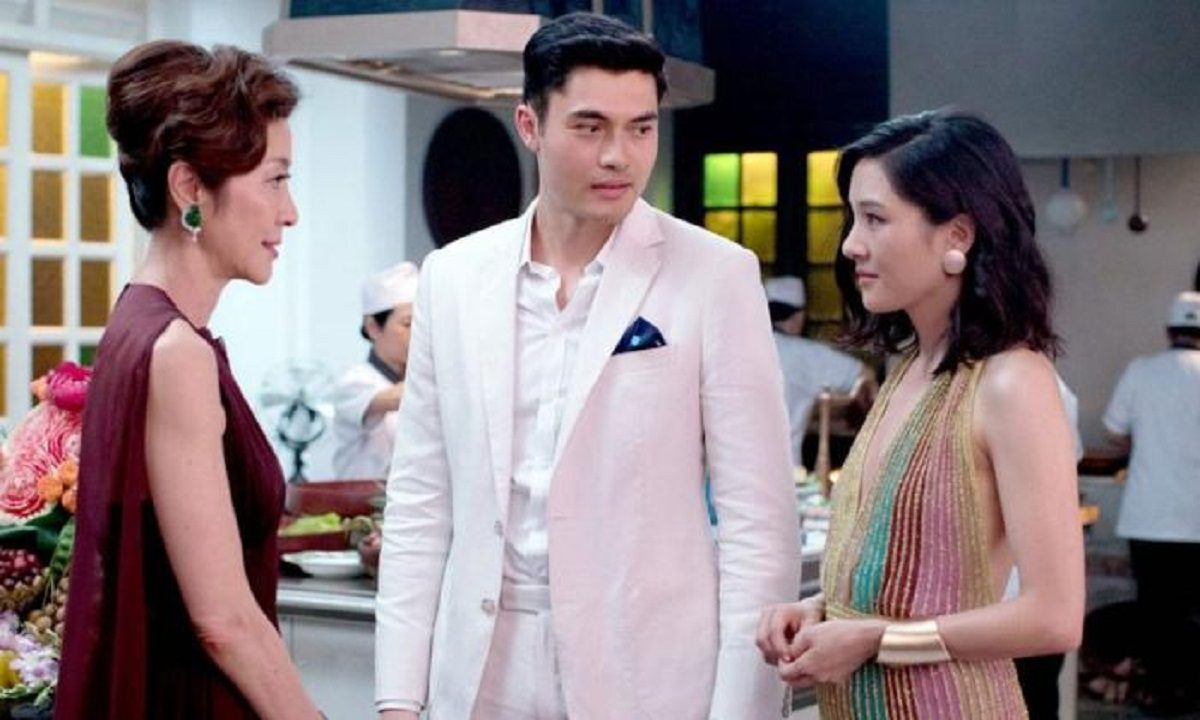
Rachel, despite being ethnic Chinese, is considered by Singapore high society, including her countless rivals for Nick’s attention, as not “one of us.” As the inimitable Peik Lin said: as an ABC, American-born Chinese, Rachel is like a banana—“yellow on the outside, white on the inside.” Then as now, be it in Singapore, New York, or Manila—people are often separated, apart by race and religion, by their impervious mindsets and self-imposed notions about class.
Despite director Jon M. Chu’s attempts to presumably stay true to the novel, he has had to cut a great deal of the book’s backstories, characterizations and side plots, including lots of cultural references, Chinese and Malay translations and historical tidbits, as generously shared by Kevin with his readers, on why Singapore has partly become what it is today—a prosperous, albeit somewhat regimented, city-state with a humble and colorful past that, in spite of its many dysfunctions, has become the envy of the world.
What we’re left, apart from a retained subplot that delves into the seemingly perfect Astrid Leong (Gemma Chan) and her marital woes, is a more polished and streamlined film version with some of the novel’s characters fused into one or dropped altogether.
Still, it begs to be asked: Why has a film with an Asian cast portraying mostly Asian characters far removed from the mainstream American experience enjoying mainstream appeal in the US and elsewhere? After watching the film, it’s easy to understand why.
If you pare down the film to the bones, what we’re left with is a classic love story, albeit a glossy rom-com set in a prosperous part of Asia, with more than its fair share of high-end designer labels and postcard-pretty Singapore scenes. For instance, we could almost smell and tastes the many mouth-watering offerings in an extended scene in the film featuring Singapore’s famous street-food market.
With age-old references to Cinderella, poor girl-falls for-rich boy storyline, disapproving future mother-in-law, love will conquer all and all that jazz, and a hilarious, scene-stealing best friend who also provides the film’s much-needed comic relief, how can the movie fail? Since the dawn of motion pictures, these are tried-and-tested ingredients that readily appeal to a wide range of audiences regardless of language, social standing and age group.
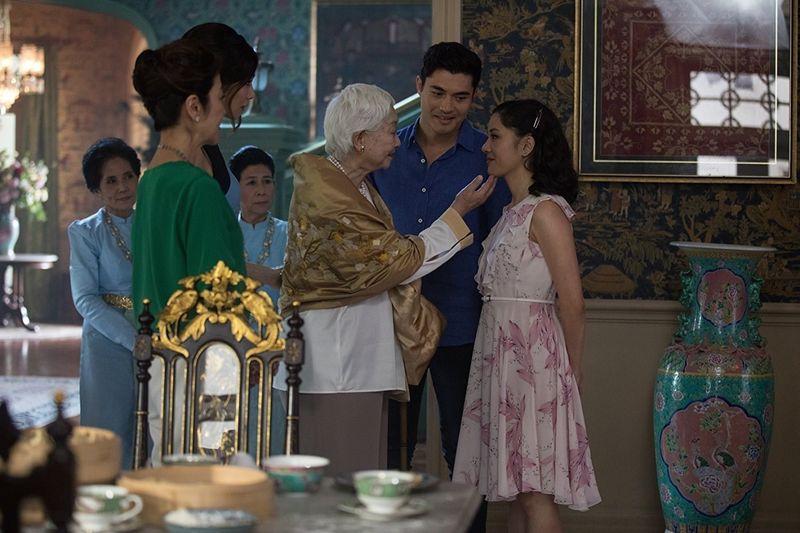
Thanks to “Crazy Rich Asian’s” fast-paced editing and imaginative camera work—the evening party scene high atop the iconic Marina Bay Sands is one of its many only-in-Singapore moments—the film is also able to appeal to millennials, who presumably comprise the bulk of Kevin’s readers.
True, there are countless passages in the book, which, because of the need for brevity, were edited out. Certain nuances also defy translation from paper to film. But Chu’s silver screen take also offers certain images that are better seen than read. Apart from the party scenes at Marina Bay Sands, for example, the Araminta Lee-Colin Khoo (played by Sonoyo Mizuno and Chris Pang, respectively) wedding in the middle of an indoor rice paddy field, as Eleanor so sarcastically pointed out, is one of them.
And what about its cast? Constance, Nick, Gemma, Akwafina and Michelle are perfect for their roles, but we wish the film could have cast a more atypical and charismatic Eddie Cheng (played by Ronny Chieng), Nick’s shallow, scheming cousin and a schmuck of a character as well as a label whore we haven’t certainly seen the last of.
As for Kris Aquino (you’ve been waiting for this, haven’t you?), we’ve saved you the best for last. As Princess Intan, a highly educated member of Malaysian royalty, the Philippines’ “most famous woman,” in Kevin’s words, more than acquits herself.
For sure, there wasn’t much the yellow-, Michael Cinco-clad Kris could chew on, given that it was a cameo role. But you could see Chu’s camera lingering more than what we felt was necessary on Kris during the wedding scene. The director probably knows Kris’ stature in the Philippines and didn’t want to lose out on the bulk of potential Filipino moviegoers.

Although it was a minuscule role, her character’s appearance was a pivotal one, as the princess was instrumental in showing the snooty Singaporeans in church that the naive Rachel is also able to hold her own and engage anyone—even a supposedly super-rich member of royalty—in intelligent conversation about, of all topics, micro loans to marginalized women.
The script is fast-paced with a number of unforgettable, rib-tickling one liners courtesy of Akwafina: “You kinda look like a slutty ebola virus,” Peik Lin tells Rachel, as the latter parades in front of her wearing one of the many party dresses sourced by Oliver. It was one of many segments wherein the clothes, not Rachel, were given the starring role.
Of the film’s many revelations and confrontations, the simmering mahjong scene between Rachel and Elenor easily stands out, as it perfectly captures the paradox the story’s characters find themselves in. It was also one of the few key scenes wherein Eleanor is able to elicit sympathy from the audience. Like Rachel, she, too, suffered and was never “good enough” in the eyes of the imperious Shang Su Yi (Lisa Lu), her rich-as-hell mother-in-law and Nick’s doting grandmother.
We’re quoting from memory: Among the many misgivings Eleanor has about Rachel, she doesn’t like the fact that, like most Americans, “you’re only after your own happiness.” Before an incredulous Rachel can respond, Eleanor goes on to say that such “happiness is an illusion.” Happiness isn’t a state one wishes to achieve or be in, Eleanor continues, instead, it’s something more concrete that people like her in Asia deliberately work for.
Perhaps. But after seeing how Eleanor’s fellow crazy rich Asians live lives fueled by jaw-dropping excess and their constant need for validation based on such seemingly important, but ultimately shallow grounds as one’s family’s extreme wealth and social standing, nothing could be more ironic. It’s ultimately they, not Rachel, whose idea of happiness is anchored on illusion.
